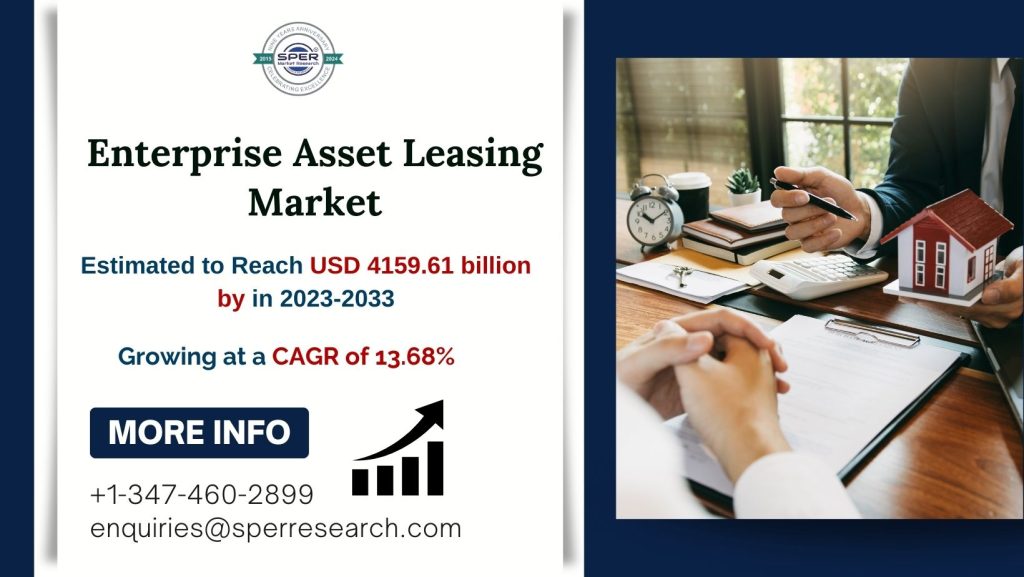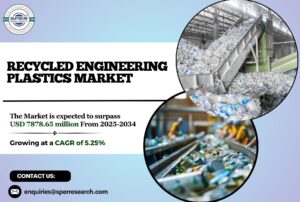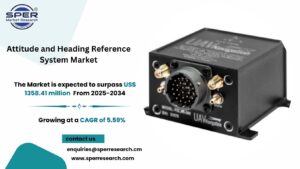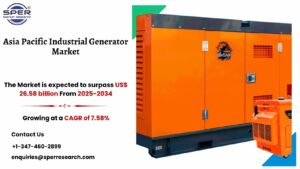Enterprise Asset Leasing Market is projected to reach USD 4159.61 billion by 2033 with a CAGR of 13.68%, driving growth opportunities and key player analysis – SPER Market Research

The right to use an asset (the underlying asset) for a predetermined amount of time in exchange for payment is conveyed through a contract, or an arrangement inside a contract, known as an enterprise asset lease. Long-term evidence suggests that leasing, in all its guises, is a workable method of funding capital equipment across the economic cycle. Land, buildings, cars, ships, and machinery used in manufacturing and construction are among the assets that many businesses lease.
According to SPER market research, ‘Enterprise Asset Leasing Market Size- By Asset Type, By Leasing Type, By Organization Size, By Industry Vertical – Regional Outlook, Competitive Strategies and Segment Forecast to 2033’ state that the Enterprise Asset Leasing Market is predicted to reach USD XX billion by 2033 with a CAGR of XX%.
Drivers:
- Growing demand for flexible financing options and the emergence of capital-intensive businesses are driving the market’s notable expansion. Innovations in technology and the requirement for companies to maximize asset use while maintaining cash flow are what are driving this rise.
- Growth in the market is being aided by businesses’ increased emphasis on cost-efficiency. Accordingly, businesses are embracing asset leasing as a wise financial decision more and more. Leasing also lessens the strain of upfront capital expenditure by offering an affordable substitute for outright purchase. Additionally, by spreading out the cost of assets across the lease term, businesses can more efficiently use their financial resources.
Request For Free Sample Report @ https://www.sperresearch.com/report-store/enterprise-asset-leasing-market.aspx?sample=1
Challenges: Numerous significant challenges that affect the market’s expansion and effectiveness are faced by the enterprise asset leasing sector. The economy’s volatility, which can lead to uncertainty and have an impact on asset valuations and leasing terms, is one of the main problems. Changing regulations can complicate leasing agreements and raise compliance expenses, which presents another challenge. Furthermore, in order for businesses to remain competitive, they must continually adapt to technology changes, which means investing in new systems and procedures.
The worldwide enterprise asset leasing business was greatly impacted by the COVID-19 pandemic. Due to disruptions, budgetary constraints, and uncertainty, businesses first reduced their leasing activity. The industries hardest hit were retail, hotel, and aviation. Leasing companies had challenges due to repossessions and unpaid bills. However, companies turned to leasing for flexibility and cost savings as the economy recovered. In sectors like technology and healthcare, there was a rise in the demand for rentals. The pandemic highlighted how important asset sustainability and scalability are, and leasing makes it possible to acquire ecologically friendly technologies. The sector is expected to recover once the world gets over the epidemic thanks to innovative asset acquisition strategies, cost-cutting initiatives, and technology advancements.
Additionally, some of the market key players are; Air Lease Corporation, BNP Paribas Leasing Solutions, Bohai Leasing Co. Ltd, Enterprise Asset Leasing, General Electric Company, ICBC Financial Leasing Co. Ltd.
For More Information, refer to below link:-
Enterprise Asset Leasing Market Outlook
Related Reports:
Follow Us –
LinkedIn | Instagram | Facebook | Twitter
Contact Us:
Sara Lopes, Business Consultant — U.S.A.
SPER Market Research
+1–347–460–2899





